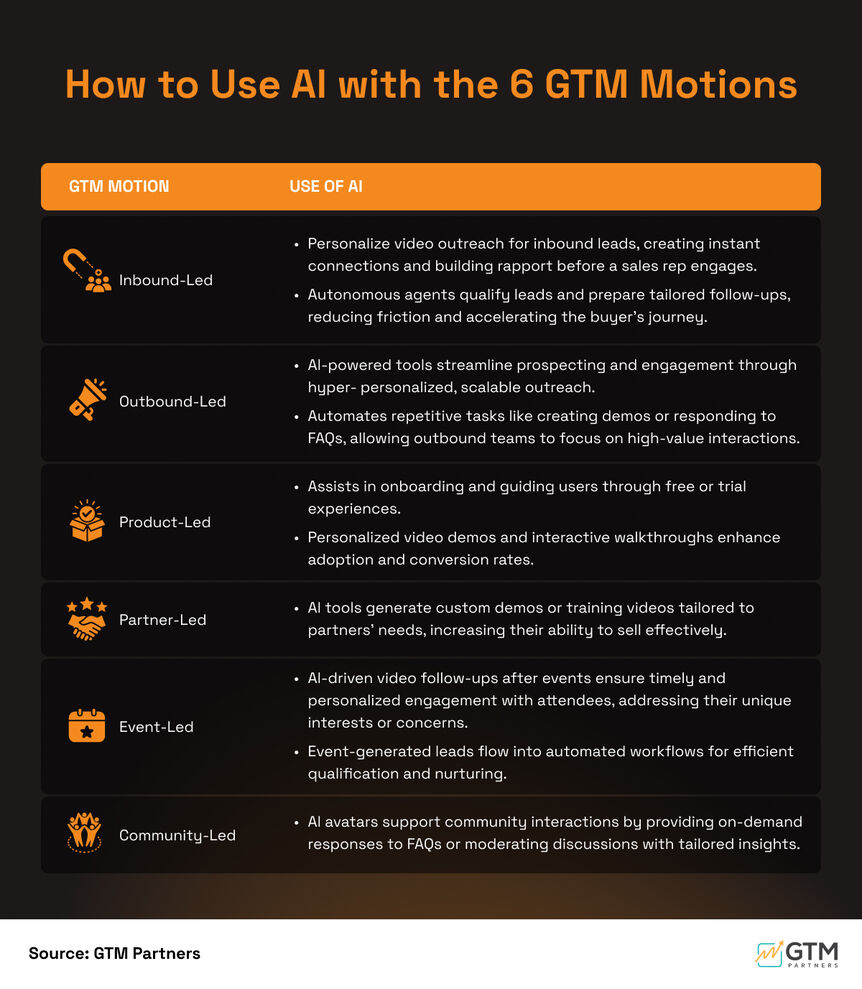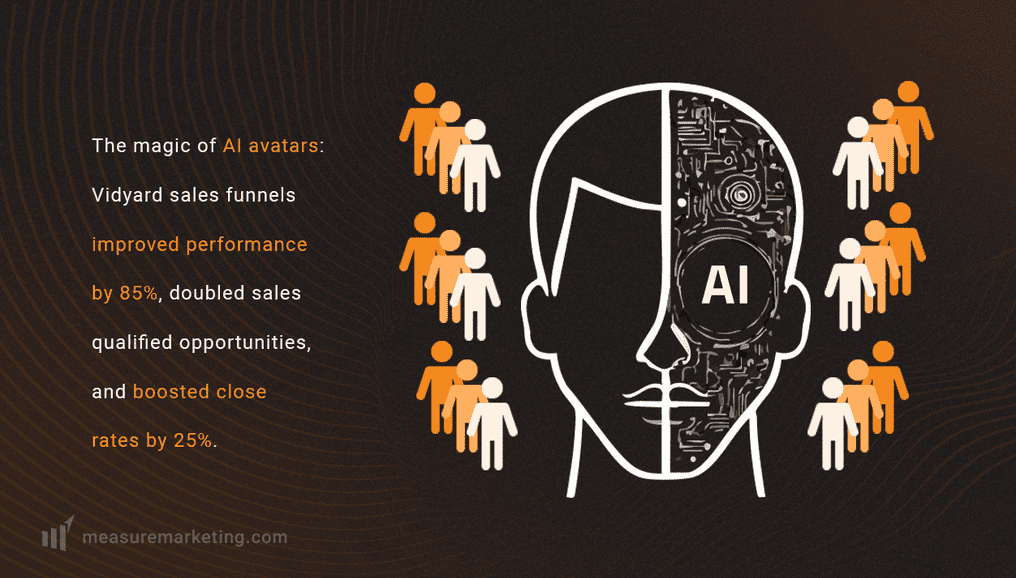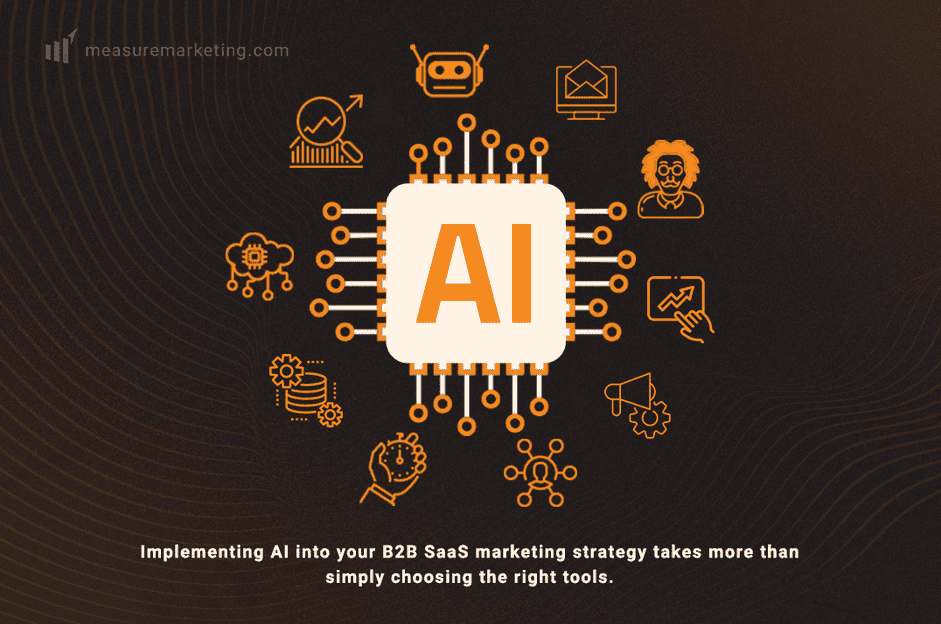Artificial Intelligence (AI) is no longer a concept of the distant future—it’s a driving force behind transformative changes in industries worldwide, including B2B SaaS marketing.
In B2B SaaS, AI is already proving its inevitable relevance, driving marketing automation, boosting personalization, and unpacking customer insights that were once hidden in mountains of data.
You risk falling behind if you’re part of this space and not using AI.
Why AI is Becoming a Marketing Game-Changer
The numbers speak volumes: 95% of businesses are using or planning to adopt AI by 2025. This rapid adoption highlights the undeniable impact of AI across industries.
One of the pioneers in adopting this change is Slack.
Slack AI has demonstrated how AI can save businesses time and effort. By summarizing over 600 million messages, Slack helped its users reclaim a million hours of aggregate read time. This kind of transformative efficiency is just one of many examples of how AI can empower marketing teams to focus on creativity, strategy, and innovation.
Redefining the Success of Marketing for SaaS
We get it: the idea of robots “taking over” marketing might sound overwhelming. But let’s be clear—AI isn’t about replacing people. It’s about amplifying human potential.
With AI, organizations can reimagine roles and workflows, enabling teams to focus on creativity and strategic decision-making while intelligent systems handle repetitive tasks. For B2B SaaS companies, embracing AI isn’t just an advantage to make their platform create more value—it’s transformative if they leverage AI in marketing the platform and reaching the audience with personalization at speed. Imagine the user data the platform collects can use AI to identify patterns for the in-market consumer for reduced sales cycles or expanding on surging accounts faster.
We are no longer in the “Growth at All Costs” mindset, that led to over-hiring and inefficiencies that no longer align with market demands. Investors now prioritize measurable ROI, often achieved through AI-driven cost reduction or revenue generation. Beyond augmentation, AI transforms sales and GTM processes, automating tasks like discovery, objection handling, and custom demos.
AI: From Augmentation to Transformation
The traditional narrative of AI as a tool to “augment” human roles is only part of the story. Today’s AI technologies are increasingly designed to replace specific roles and processes outright, particularly in sales and go-to-market (GTM) functions.
GTM Partners’ recent blog on How to Use AI with the 6 GTM Motions sums it up.

Source: https://gtmpartners.com/
However, AI success goes beyond adopting tools; it requires the right mindset. Whether deploying solutions from leading AI companies for customer insights or leveraging marketing automation for campaign management, AI is redefining what success looks like in B2B SaaS marketing.
This blog dives into the revolutionary ways AI reshapes the industry, offering actionable strategies, real-world examples, and innovations to inspire your next move.
Equip yourself with the right knowledge, stay ahead of the curve, and position yourself as a leader in this ever-evolving marketing landscape.
The Power of AI in Data Analytics and Audience Insights
One of AI’s greatest strengths is analyzing large amounts of customer information. By integrating data from customer relationship management (CRM) systems, social media, website visits, and third-party databases, AI tools create a clear picture of customer behaviour.
It spots patterns, such as purchasing habits and engagement trends, that human analysis often overlooks. This helps businesses effectively group customers into specific categories and refine their marketing campaigns.
Predictive Analytics: The Crystal Ball for Marketing
Predictive Analytics is one of many ways AI tools analyze customer data at scale. By leveraging advanced algorithms, AI predicts customer behaviours and identifies high-value accounts. This foresight allows businesses to prioritize resources and streamline marketing efforts.
For instance, AI tools can forecast customer needs, predict churn, and guide outreach strategies. It makes marketing smarter, more personal, and more effective.
A Closer Look to Ivanti and 6Sense as its Customer Data Platform
Corroborating the power of AI in data analytics and audience insights is Ivanti’s success with 6Sense’s customer data platform.
Ivanti, a leader in IT software with over 40,000 customers, faced challenges in consolidating data after acquiring several businesses. Their scattered information made tracking key metrics or making informed decisions difficult.
By adopting AI tools from 6Sense, Ivanti centralized its data, identifying customer interests through purchase history, search intent, and competitor activity.
These AI-powered insights helped them fine-tune sales outreach and create targeted paid ads. The results were impressive: a 71% increase in opportunities created, a $263.2 million pipeline, and a 94% increase in opportunities won, translating to $18.4 million in revenue.
This success underscores the potential of marketing automation and highlights how AI empowers businesses to unpack their data’s full potential.
For B2B SaaS marketers, AI’s role in data analytics goes beyond efficiency. With the right AI tools, you can leverage data to create meaningful, personalized strategies and give your business a competitive edge.
Personalization at Scale: AI’s Role in Tailored Content
Personalization is a cornerstone of effective marketing, directly influencing consumer behaviour and driving engagement.
AI tools help businesses deliver hyper-personalized experiences through dynamic content recommendations, customized product suggestions, and tailored communications, resulting in significant customer connections.
Examples of AI Tools Driving Personalization
Salesforce’s Einstein GPT
Salesforce exemplifies the transformative power of AI in personalization with its Einstein GPT.
Launched in 2023, Einstein GPT works with Salesforce’s CRM system to create tailored marketing messages, answer customer questions, and analyze trends. Its department-specific design ensures relevance, offering tailored solutions for marketing, sales, and customer service teams. Einstein GPT doesn’t just help create content but also gives businesses insights to refine their strategies and improve customer interactions.
HubSpot’s Integration with CRM
HubSpot’s integration with CRM platforms is another powerful example of businesses enhancing personalization using AI Tools.
For instance, Jedox, a global provider of business intelligence software, faced challenges with scattered data and lengthy sales cycles. By implementing HubSpot marketing automation tools, Jedox streamlined its data, developed advanced workflows, and began segmenting its audience effectively.
These efforts resulted in a 54% increase in marketing-qualified leads and a 12-20% reduction in sales cycle duration. HubSpot’s tools allowed Jedox to tailor communications for distinct buyer personas, using features like Smart Forms to gather information progressively without overwhelming prospects.
Why Marketing Automation Matters
Did you know that 74% of marketers already use at least one AI-driven tool?
Staying competitive in the fast-paced B2B SaaS landscape demands adopting AI-powered solutions like marketing automation. In addition to saving time, these tools help tailor marketing strategies by analyzing what works and automating repetitive tasks. AI can create email campaigns that speak directly to your audience’s needs, increasing engagement and improving effectiveness.
How AI Avatars and Video Tools are Changing Sales
Beyond email, AI avatars are becoming a game-changer in sales engagement.
Vidyard, a leader in AI-powered video tools, integrated personalized video messaging into sales workflows. As a result, their sales funnels improved performance by 85%, doubled sales-qualified opportunities, and boosted close rates by 25%.

Every integration of CRM, email marketing, and video tools demonstrates how leading AI companies empower businesses to create meaningful, personalized experiences. By delivering tailored, high-impact content at scale, these tools underscore the transformative power of AI in modern marketing.
As AI evolves, businesses that embrace its capabilities will be better equipped to exceed customer expectations and outpace competitors.
AI in Advertising: Essential Knowledge
AI tools have revolutionized advertising by driving efficiency, personalization, and cost-effectiveness. Today, businesses capitalize on these benefits to save time and optimize campaigns, requiring less constant human intervention.
How AI Optimizes Ad Placement and Cost
Platforms like Meta use AI tools to decide how often and where ads appear on Facebook and Instagram. They calculate ad relevance and frequency to determine costs and visibility.
For instance, ads with higher relevance scores ensure better placement and reduced costs, while overexposure to ads can diminish performance due to declining relevance scores.
This automated process optimizes campaigns without human intervention, ensuring businesses get the most out of their ad budgets.
Vanguard Boosts Conversion Rates with AI
Let’s also take notes from Vanguard’s success, one of the world’s largest investment firms.
By partnering with Persado’s AI platform, Vanguard created hyper-personalized LinkedIn ads tailored to their regulatory environment. The platform tested multiple ad versions at scale to find the most effective strategies for engaging their audience. As a result, Vanguard increased their conversion rates by 15%.
Without AI, this level of precision would have been impossible. With AI’s ability to handle complex data, marketing teams can focus on strategic growth, making technologies like these indispensable.
Delivering Better Leads with Automated Targeting
AI tools also excel at real-time ad optimization. By automating tasks like testing keywords, audiences, and budgets, businesses can achieve superior results.
Stanley Black & Decker (SB&D) illustrates this well. Their local dealers, who lacked the expertise to execute online campaigns, benefited from an AI-powered strategy that set up Google Search ads targeting high-conversion leads. These campaigns decreased their cost per lead by 49% and increased dealer leads by 163%, demonstrating how programmatic advertising improves targeting and delivers better results.
These innovations use AI to deliver highly targeted ads to the right audience, ensuring businesses reach qualified leads more effectively.
Challenges and Considerations in AI-Driven Marketing
Without question, AI has transformed B2B SaaS marketing, but it brings challenges that businesses must address to use it responsibly. Issues like data privacy, maintaining authenticity, and the ethics of AI in marketing are at the forefront of these considerations.
Let’s break it down:
- Data Privacy Concerns
Using AI tools for marketing automation often requires access to user data, raising serious privacy questions.
According to Wing’s recent findings, 70% of the top 10 most commonly used applications from AI companies may use customer data for training their models. This raises critical questions about data ownership and the potential misuse of sensitive business information. The risks extend to intellectual property leakage, third-party sharing, and compliance violations—issues that SaaS businesses cannot afford to overlook.
- Balancing Automation and Human Connection
Maintaining authenticity is another challenge in AI-driven marketing. As AI generates more marketing content, marketers must hold a personal, human touch. Overreliance on AI tools can feel impersonal, driving away consumers who value genuine, human-centred engagement.
- Ethical Considerations in AI Marketing
Equally important are the ethical considerations of AI in marketing practices. Without established legal frameworks, marketers must proactively adopt transparent and ethical standards. These include:
- Preventing algorithmic bias
- Transparency on how AI is being used and how it affects the consumer’s behaviour
- Giving customers control over how their data is used
Transparency builds trust, and trust is key to brand loyalty.
Consumers are increasingly aware of AI’s influence and are quick to act on privacy concerns. According to a 2022 Cisco survey, 76% of respondents would not buy from companies they don’t trust with their data.
When companies overlook this, the consequences can be severe—losing customer confidence and damaging long-term relationships.
The Way Forward: Embracing Responsible AI Practices
To succeed, businesses must embrace responsible AI practices. By doing so, they can build trust and stand out in the crowded marketplace.
AI companies prioritizing ethical innovation, transparency, and privacy will lead the way in transforming marketing, all while protecting consumer relationships and their credibility.
How to Implement AI in Your B2B SaaS Marketing Strategy

Successfully implementing AI requires more than acquiring new tools; it calls for a well-thought-out plan aligning with your business goals.
Here’s how your B2B SaaS company can leverage AI to transform your marketing efforts effectively.
1. Define Your Goals
Before diving into AI, identify the key areas where it can impact most. Are you looking to streamline repetitive tasks, improve customer personalization, or gain deeper insights through analytics?
For instance, marketing automation can drastically reduce manual work, allowing teams to focus on strategic activities like campaign ideation and optimization.
Set clear objectives and measurable outcomes. For example, studies by McKinsey reveal that companies using AI for personalization can achieve a revenue uplift of 5-15% while improving customer satisfaction. Defining these goals upfront ensures your AI initiatives are targeted and impactful.
2. Choose the Right AI Tools
The success of your AI integration depends on selecting the right AI tools tailored to your needs. Platforms like Salesforce Einstein offer AI-driven CRM solutions, while Vidyard provides personalized video marketing powered by AI.
Additionally, programmatic advertising platforms such as The Trade Desk enable businesses to automate ad placements, maximizing ROI with real-time data.
A recent Boston Consulting Group (BCG) study underscores the transformative impact of AI tools, especially generative AI, on marketing productivity. The April 2023 survey, which involved over 200 Chief Marketing Officers (CMOs) from North America, Europe, and Asia, revealed that 70% of participants had integrated generative AI into their operations. Of these, an impressive 90% reported positive or highly positive outcomes.
The study highlighted that productivity in marketing processes increased by as much as 30%, underscoring AI’s potential to streamline campaign management and elevate customer engagement.
The key is to focus on platforms that align with your goals, whether geared toward customer insights, automation, or content generation.
3. Train Your Team
Even the most advanced AI systems require human oversight and expertise.
Building AI literacy within your team is critical to ensure smooth adoption. This includes training employees to use new platforms effectively, interpret AI-generated insights, and maintain a balance between automation and human creativity.
Moreover, understanding the ethics of AI is essential. Encourage your team to consider issues like data privacy, transparency, and fairness when deploying AI solutions. A Gartner report highlights that 85% of AI projects could fail without addressing ethical considerations, underscoring the importance of responsible AI use.
4. Monitor and Refine Continuously
AI implementation isn’t a one-and-done process. It requires ongoing evaluation and refinement to maximize its potential.
Regularly analyze performance metrics to assess the effectiveness of AI-driven initiatives. Monitoring engagement rates in personalized email campaigns or ROI from programmatic advertising can provide valuable insights into what’s working and what needs adjustment.
A notable example is Klarna, which leveraged generative AI tools to transform its workflows, cutting image production costs by an astounding $6 million. Additionally, it reduced development cycles from six weeks to just seven days.
This highlights the power of continuous refinement in AI-driven initiatives.
By monitoring performance, identifying areas for improvement, and adapting strategies, your B2B SaaS company can achieve streamlined operations, significant cost savings, and enhanced customer engagement—resulting in long-term marketing success.
The AI Revolution is Here
Integrating AI into B2B SaaS marketing is a game-changer, offering tools to automate workflows, enhance personalization, and drive growth.
However, success hinges on aligning AI implementation with your business objectives and ethical considerations. Thoughtful planning and execution can position your business as an industry leader.
Ready to Lead the Charge?
AI is revolutionizing B2B SaaS marketing, offering once unimaginable capabilities. From predictive analytics to programmatic advertising, AI tools empower businesses to enhance customer engagement, streamline operations, and boost ROI.
At our core, we believe AI isn’t just about automating tasks—it’s about rethinking what’s possible. Whether you’re exploring solutions from leading AI companies or seeking to optimize your tech stack, now is the time to act. Together, we can harness the transformative power of AI to position your business as a market leader and exceed expectations.
Let’s make growth happen. Reach out to explore how AI can elevate your efficiency and define your next breakthrough.